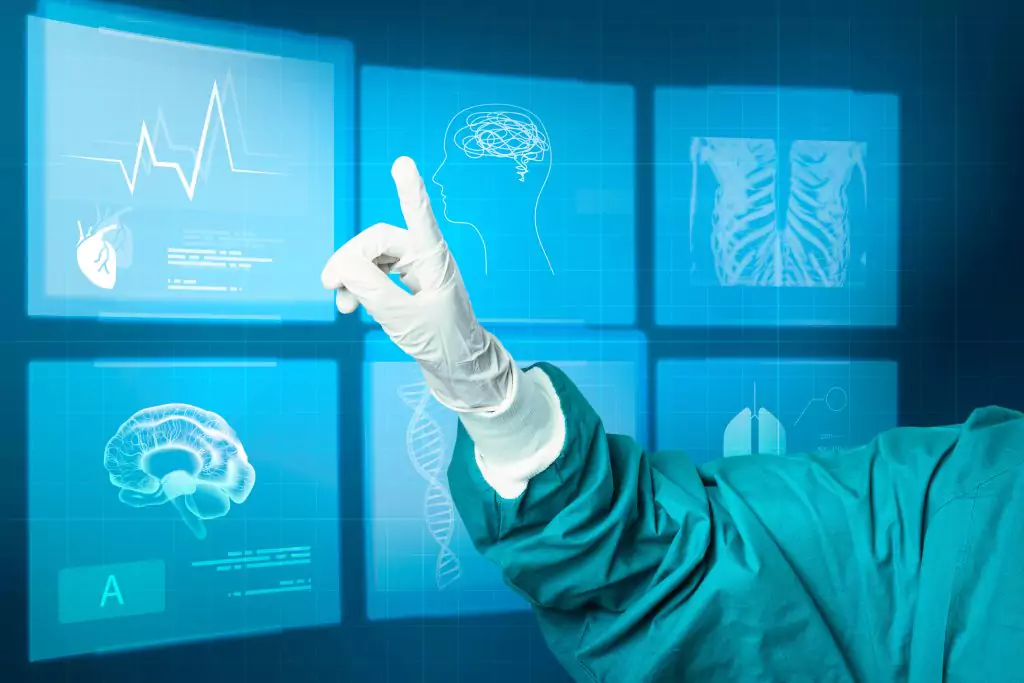
✅ AI Essay Writer ✅ AI Detector ✅ Plagchecker ✅ Paraphraser
✅ Summarizer ✅ Citation Generator
Researchers at Stanford University and their collaborators have outlined a promising future for generalist medical artificial intelligence (GMAI) models, which could revolutionize healthcare by offering more versatile and efficient AI assistance to medical professionals across disciplines. Their perspective on the potential of GMAI and the challenges it presents was published in the April 12 issue of Nature.

Key Takeaways:
- Generalist Medical Artificial Intelligence (GMAI) models represent a “paradigm shift” in medical AI, as they are designed to address a broader range of medical applications and data types, offering more versatile and efficient assistance to medical professionals across disciplines.
- The potential applications for GMAI models are vast, including chatbots for patients, note-taking, bedside decision support, and drafting radiology reports, which could help reduce inefficiencies and errors resulting from human doctors’ hyper-specialization.
- Challenges in GMAI development include verification, privacy safeguards, and minimizing social biases, which are crucial for building trust in the technology and fully realizing its potential to revolutionize healthcare and improve patient outcomes.
Unlike the more than 500 AI models for clinical medicine approved by the FDA, which perform one or two narrow tasks, GMAI models are being designed to address a broader range of medical applications and data types. Jure Leskovec, a professor of computer science at Stanford Engineering, sees this as a “paradigm shift” in the field of medical AI.
GMAI models will interpret varying combinations of data, including imaging, electronic health records, lab results, genomics, and medical text. This goes well beyond the abilities of current models like ChatGPT. In addition to offering spoken explanations, GMAI models will provide recommendations, draw sketches, and annotate images.
Michael Moor, a co-first author of the paper, highlights the profound potential impact of GMAI models as they will not be limited to a single area of expertise, but rather possess abilities across multiple medical specialties. This could help reduce inefficiencies and errors resulting from the hyper-specialization of human doctors.
The authors, including researchers from Harvard University, Yale, University of Toronto, and Scripps Research Translational Institute, envision GMAI models tackling various applications such as chatbots for patients, note-taking, and bedside decision support for doctors. In radiology, for example, these models could draft reports, visually point out abnormalities, and take the patient’s history into account.
However, the researchers also address the challenges and concerns of GMAI development. Verification is a significant issue, as it is crucial to ensure that the models are correct and not producing false information. Privacy safeguards and minimizing social biases are also essential to ensure that GMAI models can be trusted.
Leskovec believes that the current technology is promising, but there are still aspects that need to be addressed. Identifying missing pieces such as verification of facts, understanding biases, and explainability of answers is vital to fully realizing the potential of GMAI in the medical field.
As the development of GMAI continues, it promises to revolutionize healthcare by offering versatile, efficient, and accurate AI assistance to medical professionals, ultimately leading to better patient outcomes and more streamlined medical care.
AI Technologies Set to Transform the Medical Landscape: A Comprehensive List of Applications
The potential for AI technologies to transform various aspects of medicine is becoming increasingly apparent. Here is a list of methods in which AI technologies could be applied across the medical field:
Diagnostics
AI can assist in the early detection and diagnosis of diseases by analyzing medical images, electronic health records, and lab results, helping medical professionals identify patterns that may be difficult to discern manually.
Personalized treatment plans
AI can use patient-specific data, including genetic information, to recommend tailored treatment plans, increasing the likelihood of successful outcomes.
Drug discovery
AI can expedite the process of discovering and developing new drugs by simulating molecular interactions, predicting potential side effects, and identifying optimal dosages.
Telemedicine
AI-powered chatbots can provide patients with medical advice, schedule appointments, and monitor chronic conditions remotely, increasing access to healthcare, especially in rural and underserved areas.
Surgical assistance
AI can help surgeons plan and execute complex procedures by providing real-time guidance, simulating potential outcomes, and even assisting in robotic surgeries.
Mental health support
AI-driven applications can offer mental health counseling, monitor patient progress, and detect early signs of depression or anxiety, providing valuable support for patients and healthcare professionals alike.
Health monitoring
AI-powered wearable devices can track vital signs, physical activity, and sleep patterns, allowing for early intervention in the event of any concerning changes.
Predictive analytics
AI can analyze large volumes of data to predict disease outbreaks, identify at-risk populations, and optimize resource allocation in public health settings.
Medical research
AI can facilitate the analysis of complex datasets, accelerating medical research and enabling the discovery of new insights into the causes and progression of various diseases.
Medical education: AI can enhance medical education by offering personalized learning experiences, virtual reality simulations, and real-time feedback, better preparing future healthcare professionals for their careers.
Related stories:
US Seeks Public Input on AI Regulation as ChatGPT Gains Popularity
The Post-Pandemic Puzzle: High School Diplomas Rise Amid Declining Test Scores and Attendance
From Classroom to Screen: Reshaping Nursing Education in a Pandemic World
Follow us on Reddit for more insights and updates.





Comments (0)
Welcome to A*Help comments!
We’re all about debate and discussion at A*Help.
We value the diverse opinions of users, so you may find points of view that you don’t agree with. And that’s cool. However, there are certain things we’re not OK with: attempts to manipulate our data in any way, for example, or the posting of discriminative, offensive, hateful, or disparaging material.